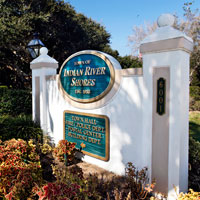 Shores ponders a tax boost to fund pension liabilities
Shores ponders a tax boost to fund pension liabilities
STORY BY LISA ZAHNER, (Week of August 4, 2011)
If property taxes go up for Indian River Shores residents, it will not be to buy the new “big red” ambulance or to pay staff, but instead to improve the town’s balance sheet.
The Shores has about $2.7 million in unrestricted net assets made up mostly of a $2.4 million emergency reserve fund, but it also owes about $2.8 million in unfunded pension liability that it would normally pay off over a decade or more. Freshman Councilman Dick Haverland doesn’t like the imbalance in the books.
In the business world, Haverland said, that would be unacceptable. “I’m just trying to get us on some realistic page so we can face the music because it’s not easy music to dance to,” he said.
In government, however, there’s a popular dance called the side-step when it comes to long-term liabilities.
Pension funds can go woefully underfunded because the actuary assumes the perpetual nature of the government entity – that unlike a corporation , it will always be there to fund pensions for retirees. For example, a government pension program that is 85 per cent funded is considered “fully funded” even though that 15 per cent difference could be tens of millions of dollars.
“We’re basically on the same page, but I don’t want to do it all at once,” said
Mayor Tom Cadden, who in his eight years serving in local government has seen lots of hopping up and down related to the sticker shock new elected officials experience when they see huge numbers like pension liabilities. “I want to fix it, but I want to fix it in steps,” he said.
Town Treasurer Judy Lewis advised the council to stick with the pension fund manager’s recommendations. “We rely on his expertise as to how much to put in and I don’t believe in putting in more than he tells us,” she said.
No amount of explaining from the treasurer or from Cadden could quell Haverland’s feelings about appearing to be in the red. He wants the town to start digging out from the huge liability, even if it means that property taxes have to go up a little.
“Let me tell you, if your net assets are below zero, you’re insolvent,” Haverland said.
A wave of fiscal responsibility on the council, led by Haverland, could lead the board to fund the Shores employee pension plan at a quicker rate instead of banking on what could be pie-in-the-sky investment returns.
The taxpayers’ annual contribution to the fund is based upon an 8.75 per cent rate of return, minus one percent for fees, resulting in a net 7.75 per cent return. When Haverland found this out during a presentation by the town’s actuaries earlier this summer, he bristled at the gamble of setting the bar so high with the fund’s portfolio being heavily weighted in short-term bonds.
Haverland consulted with four local trust account managers from Northern Trust, U.S. Trust, PNC Wealth Management and New York Mellon Trust to get their take on whether the actuaries’ expectations were unrealistic. He provided them copies of the fund’s investments and recent past performance.
“I asked their view of what an average rate or return would be and they said 6.7 per cent gross or 5.7 percent net, on average,” Haverland said. “It strikes me as impossible that we would end up assuming the same rate of return that we’re assuming today. It’s the classic case of kicking the can down the road.”
The Town Council voted last week to set the maximum property tax rate at $1.60 per $1,000 of assessed, taxable value. This is a 10.93 per cent increase over the “rollback rate” as adjusted for the 2.5 per cent decline in property values and a 13 per cent increase over the current rate.
That’s the rate that likely will go out on Shores residents’ truth in millage or TRIM statements this week. At the end of the budget process, the council can always reduce that millage rate, but it cannot exceed it.
“We’ll get killed in the newspaper,” said Councilman Jerry Weick.
“That’s life in the big city,” Cadden said, adding that he very much expected to end up with a much lower rate than the $1.60 per $1,000 approved last week.
In fact, the Shores Town Council approved the preliminary budget of $4.69 million, which is based on a lower tax rate.
Near the end of the meeting, Cadden suggested a compromise. “If you’re going to send a message to the people in the town that the council wants to lower the number, then maybe do half and half – half out of the hurricane reserves and half out of ad valorem,” he said.
The Shores will take up its budget two more times in the coming weeks, with the next public hearing scheduled for Sept. 8 at 5:01 p.m. at the Town Hall.








